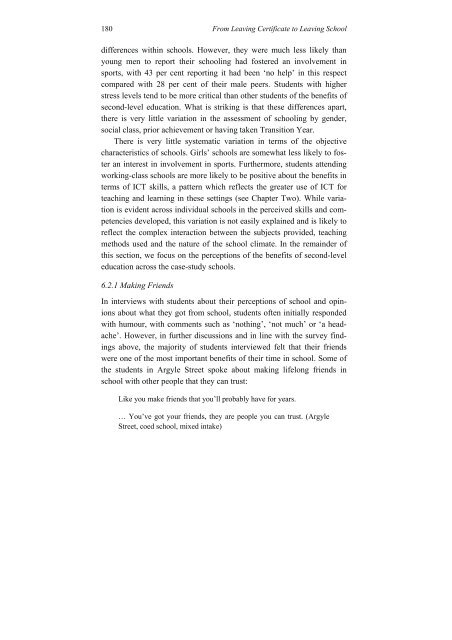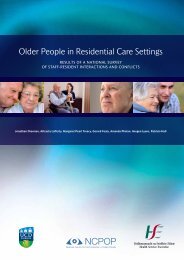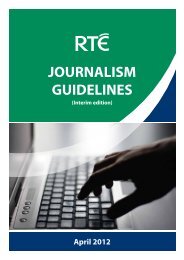From Leaving CertiFiCate to Leaving SChooL a Longitudinal Study ...
From Leaving CertiFiCate to Leaving SChooL a Longitudinal Study ...
From Leaving CertiFiCate to Leaving SChooL a Longitudinal Study ...
Create successful ePaper yourself
Turn your PDF publications into a flip-book with our unique Google optimized e-Paper software.
180<br />
<strong>From</strong> <strong>Leaving</strong> Certificate <strong>to</strong> <strong>Leaving</strong> School<br />
differences within schools. However, they were much less likely than<br />
young men <strong>to</strong> report their schooling had fostered an involvement in<br />
sports, with 43 per cent reporting it had been ‘no help’ in this respect<br />
compared with 28 per cent of their male peers. Students with higher<br />
stress levels tend <strong>to</strong> be more critical than other students of the benefits of<br />
second-level education. What is striking is that these differences apart,<br />
there is very little variation in the assessment of schooling by gender,<br />
social class, prior achievement or having taken Transition Year.<br />
There is very little systematic variation in terms of the objective<br />
characteristics of schools. Girls’ schools are somewhat less likely <strong>to</strong> foster<br />
an interest in involvement in sports. Furthermore, students attending<br />
working-class schools are more likely <strong>to</strong> be positive about the benefits in<br />
terms of ICT skills, a pattern which reflects the greater use of ICT for<br />
teaching and learning in these settings (see Chapter Two). While variation<br />
is evident across individual schools in the perceived skills and competencies<br />
developed, this variation is not easily explained and is likely <strong>to</strong><br />
reflect the complex interaction between the subjects provided, teaching<br />
methods used and the nature of the school climate. In the remainder of<br />
this section, we focus on the perceptions of the benefits of second-level<br />
education across the case-study schools.<br />
6.2.1 Making Friends<br />
In interviews with students about their perceptions of school and opinions<br />
about what they got from school, students often initially responded<br />
with humour, with comments such as ‘nothing’, ‘not much’ or ‘a headache’.<br />
However, in further discussions and in line with the survey findings<br />
above, the majority of students interviewed felt that their friends<br />
were one of the most important benefits of their time in school. Some of<br />
the students in Argyle Street spoke about making lifelong friends in<br />
school with other people that they can trust:<br />
Like you make friends that you’ll probably have for years.<br />
… You’ve got your friends, they are people you can trust. (Argyle<br />
Street, coed school, mixed intake)

















